21 sept 2015
|
|
The 14-year old Kamal Akram Abu Hadwan suffered pains and nausea after he was assaulted by the occupation forces in Beit Hanina; he is still under medical observation at the hospital.
Akram Abu Hadwan explained that the forces assaulted his 14-year old son while he was in front of car-repair shop. Kamal went outside and was sitting on a bench concurrently with the passing of a patrol in the area. Abu Hadwan added that the police dismounted from their vehicle and assaulted one child in the street and then headed towards Kamal and surrounded him and then accused him of stealing a motorcycle; he declined charges. The police then called the owner of the motorcycle who confirmed that he had parked it in that area in Beit Hanina. He added that the forces insisted on accusing his son of assaulting the |
police personnel and obstructing their work by not showing them his ID; note that he is a minor and doesn’t have an ID yet. Four police personnel then severely beat the child causing him to bleed; he also lost consciousness while being dragging him to the police vehicle.
The patrol’s individuals then hit him inside the vehicle before he was transferred to “Nabi Yaakov” police station.
He explained that the interrogator accused him of assaulting a policeman and then released him. Kamal’s father explained that he will file a claim against the policemen who assaulted his son for no reason.
He also pointed out that his son is still under medical observation in the hospital due to the bruises and pains he suffered.
The patrol’s individuals then hit him inside the vehicle before he was transferred to “Nabi Yaakov” police station.
He explained that the interrogator accused him of assaulting a policeman and then released him. Kamal’s father explained that he will file a claim against the policemen who assaulted his son for no reason.
He also pointed out that his son is still under medical observation in the hospital due to the bruises and pains he suffered.
|
|
The occupation authorities closed some of Al-Aqsa Gates on Monday afternoon and prevented men under the age of 40 from entering while allowed some men and women to enter and perform the Evening and Night Prayers and detained their IDs at the gates before entering.
Wadi Hilweh Information Center was informed that the occupation forces were suddenly deployed at Al-Aqsa gates and closed the gates: Lions, Al-Qataneen, Al-Hadeed, Al-Ghawanmeh and King Faisal while the gates: Hutta, Al-Majles and Al-Silsileh were left open. They established iron barriers at the gates and imposed restriction on the entrance of worshippers. Witnesses explained that the occupation police evacuated the young |
men from the courtyards of Al-Aqsa Mosque immediately after the Afternoon Prayer was over.
The Israeli restrictions come on the eve of “Kippur” holiday concurrently with a decision to impose a complete closure on the West Bank starting Tuesday at 12 p.m. until Wednesday night.
Video…scenes while the Israeli occupation prevented worshippers (men and women) from entering Al-Aqsa Mosque last week for three consecutive days since the morning hours until noon on occasion of the Jewish New Year.
The Israeli restrictions come on the eve of “Kippur” holiday concurrently with a decision to impose a complete closure on the West Bank starting Tuesday at 12 p.m. until Wednesday night.
Video…scenes while the Israeli occupation prevented worshippers (men and women) from entering Al-Aqsa Mosque last week for three consecutive days since the morning hours until noon on occasion of the Jewish New Year.
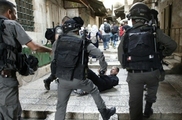
Israeli police said Monday that thousands of officers would be deployed in occupied East Jerusalem ahead of the Yom Kippur and Eid al-Adha holidays after three days of clashes rocked the Al-Aqsa Mosque compound, last week.
Authorities also said 21 Palestinians were detained overnight in East Jerusalem linked to last week's unrest at Al-Aqsa which saw Israeli police violently clash with Palestinian protesters. According to AFP, those detentions were in addition to 39 others in the West Bank and East Jerusalem, over the weekend.
Yom Kippur begins Tuesday night and lasts until Wednesday evening, with thousands of Jews expected to visit the Western Wall below the Al-Aqsa compound in Jerusalem's Old City.
The Muslim Eid al-Adha holiday begins Wednesday and continues until Sunday. Beginning on Monday night, traffic will be restricted around the Old City and checkpoints will be set up.
Last week's clashes occurred as Jews celebrated their New Year, or Rosh Hashanah.
Police said they raided the Al-Aqsa compound to stop Palestinians who had barricaded themselves inside the mosque from disrupting visits by Jews and tourists.
Clashes broke out during the raids, with protesters throwing stones, fireworks and other material at police, who shot tear gas canisters, stun grenades, and rubber-coated steel bullets.
There were also fierce clashes in the alleyways of Jerusalem's Old City outside the mosque compound. Further unrest occurred on Friday in the occupied West Bank and sporadically in East Jerusalem.
In the wake of the clashes, Israeli Prime Minister Benjamin Netanyahu vowed "war" on Palestinian stone-throwers after announcing a toughening of penalties for stone-throwers at an emergency meeting of ministers and security officials overnight Tuesday.
In the meeting, Netanyahu also reportedly asked Israel's Attorney General to allow police to employ open-fire regulations used in the West Bank, including sniper fire and the use of 0.22 inch Ruger rifles fitted with sniper scopes.
Al-Aqsa is the third-holiest site in Islam, and the site is also venerated by Jews as the Temple Mount and is considered the most sacred in Judaism.
Palestinians have been alarmed by an increase in visits by Jews to the site and fear rules governing the compound will be changed. Jews are allowed to visit but not to pray, to avoid provoking tensions. Israeli Prime Minister Benjamin Netanyahu has said repeatedly he is committed to the status quo at the site.
Israel seized East Jerusalem, where Al-Aqsa is located, in the 1967 Six-Day War and later annexed it in a move never recognized by the international community.
In a further sign of heightened tensions, Israel has also deployed two anti-missile batteries around the cities of Sderot and Netivot near the Gaza Strip, army radio reported.
Three rockets were fired into southern Israel in recent days from the Palestinian enclave, without causing any injuries. On Friday, Israel launched retaliatory air strikes on the territory.
-- --
An Israeli soldier sustained injuries overnight as clashes broke out during a visit to Joseph's Tomb in Nablus, Israel's army said.
Around 60 Palestinians hurled rocks, Molotov cocktails, and rolled burning tires at a group of Israelis visiting the site under armed guard, an army spokesperson said.
Israeli media reported that up to 2,000 Israelis took part in the visit.
Under the 1993 Oslo Accords, the site was to remain under Israeli control. But the Israeli army evacuated the premises in October 2000 shortly after the start of the Second Intifada, and it was immediately damaged and burnt by Palestinians.
Following security cooperation with the Palestinian Authority, the Israeli army allows Jewish worshipers to make monthly nocturnal pilgrimages to the site.
Joseph's Tomb is revered by Jews, Muslims, Christians and Samaritans.
Injuries reported in violent clashes in Nablus, al-Khalil
Violent clashes with Israeli Occupation Forces (IOF) broke out at noon Monday in Nablus and al-Khalil West Bank cities in the wake of pro-Aqsa marches.
Eyewitnesses told the PIC reporter that dozens of school students took to the streets in a pro-Aqsa march. The IOF soldiers fired tear gas and stun grenades directly at the children who, in turn, threw stones at the soldiers and closed the main road by torched tires to block traffic against Israeli patrols.
The union of teachers in Nablus suspended school time at all West Bank schools after 11 am for the participation in pro-Aqsa demonstrations.
As for al-Khalil, a number of Palestinian youths got injured and suffered suffocation in clashes that erupted in several locations in the city.
The activist against settlement Mohammad Awad told the PIC reporter that clashes erupted in Asidah district near Beit Ummar in northern al-Khalil in the wake of quelling a pro-Aqsa march by IOF troops.
Israeli forces shot rubber bullets and sound bombs at the march leading to the injury of a 17-year-old boy in his foot. Two others were wounded by rubber bullets while some others suffered suffocation.
In the same context, similar clashes broke out in the nearby Halhoul town. A number of Palestinians suffered from inhaling tear gas. Israeli soldiers closed an entrance of the town following a pro-Aqsa rally.
Authorities also said 21 Palestinians were detained overnight in East Jerusalem linked to last week's unrest at Al-Aqsa which saw Israeli police violently clash with Palestinian protesters. According to AFP, those detentions were in addition to 39 others in the West Bank and East Jerusalem, over the weekend.
Yom Kippur begins Tuesday night and lasts until Wednesday evening, with thousands of Jews expected to visit the Western Wall below the Al-Aqsa compound in Jerusalem's Old City.
The Muslim Eid al-Adha holiday begins Wednesday and continues until Sunday. Beginning on Monday night, traffic will be restricted around the Old City and checkpoints will be set up.
Last week's clashes occurred as Jews celebrated their New Year, or Rosh Hashanah.
Police said they raided the Al-Aqsa compound to stop Palestinians who had barricaded themselves inside the mosque from disrupting visits by Jews and tourists.
Clashes broke out during the raids, with protesters throwing stones, fireworks and other material at police, who shot tear gas canisters, stun grenades, and rubber-coated steel bullets.
There were also fierce clashes in the alleyways of Jerusalem's Old City outside the mosque compound. Further unrest occurred on Friday in the occupied West Bank and sporadically in East Jerusalem.
In the wake of the clashes, Israeli Prime Minister Benjamin Netanyahu vowed "war" on Palestinian stone-throwers after announcing a toughening of penalties for stone-throwers at an emergency meeting of ministers and security officials overnight Tuesday.
In the meeting, Netanyahu also reportedly asked Israel's Attorney General to allow police to employ open-fire regulations used in the West Bank, including sniper fire and the use of 0.22 inch Ruger rifles fitted with sniper scopes.
Al-Aqsa is the third-holiest site in Islam, and the site is also venerated by Jews as the Temple Mount and is considered the most sacred in Judaism.
Palestinians have been alarmed by an increase in visits by Jews to the site and fear rules governing the compound will be changed. Jews are allowed to visit but not to pray, to avoid provoking tensions. Israeli Prime Minister Benjamin Netanyahu has said repeatedly he is committed to the status quo at the site.
Israel seized East Jerusalem, where Al-Aqsa is located, in the 1967 Six-Day War and later annexed it in a move never recognized by the international community.
In a further sign of heightened tensions, Israel has also deployed two anti-missile batteries around the cities of Sderot and Netivot near the Gaza Strip, army radio reported.
Three rockets were fired into southern Israel in recent days from the Palestinian enclave, without causing any injuries. On Friday, Israel launched retaliatory air strikes on the territory.
-- --
An Israeli soldier sustained injuries overnight as clashes broke out during a visit to Joseph's Tomb in Nablus, Israel's army said.
Around 60 Palestinians hurled rocks, Molotov cocktails, and rolled burning tires at a group of Israelis visiting the site under armed guard, an army spokesperson said.
Israeli media reported that up to 2,000 Israelis took part in the visit.
Under the 1993 Oslo Accords, the site was to remain under Israeli control. But the Israeli army evacuated the premises in October 2000 shortly after the start of the Second Intifada, and it was immediately damaged and burnt by Palestinians.
Following security cooperation with the Palestinian Authority, the Israeli army allows Jewish worshipers to make monthly nocturnal pilgrimages to the site.
Joseph's Tomb is revered by Jews, Muslims, Christians and Samaritans.
Injuries reported in violent clashes in Nablus, al-Khalil
Violent clashes with Israeli Occupation Forces (IOF) broke out at noon Monday in Nablus and al-Khalil West Bank cities in the wake of pro-Aqsa marches.
Eyewitnesses told the PIC reporter that dozens of school students took to the streets in a pro-Aqsa march. The IOF soldiers fired tear gas and stun grenades directly at the children who, in turn, threw stones at the soldiers and closed the main road by torched tires to block traffic against Israeli patrols.
The union of teachers in Nablus suspended school time at all West Bank schools after 11 am for the participation in pro-Aqsa demonstrations.
As for al-Khalil, a number of Palestinian youths got injured and suffered suffocation in clashes that erupted in several locations in the city.
The activist against settlement Mohammad Awad told the PIC reporter that clashes erupted in Asidah district near Beit Ummar in northern al-Khalil in the wake of quelling a pro-Aqsa march by IOF troops.
Israeli forces shot rubber bullets and sound bombs at the march leading to the injury of a 17-year-old boy in his foot. Two others were wounded by rubber bullets while some others suffered suffocation.
In the same context, similar clashes broke out in the nearby Halhoul town. A number of Palestinians suffered from inhaling tear gas. Israeli soldiers closed an entrance of the town following a pro-Aqsa rally.

The Israeli municipality of West Jerusalem approved, last Sunday night, a decision to replace the original names of several streets and districts in and outside Jerusalem’s Old City with ‘Hebrew’ names that carry Talmudic connotations, according to WAFA correspondence.
Among the streets slated for change is the name of Jabal al-Zayotoun (Mount of Olives) district, which is set to be changed into “Har Hamshaha”, the Talmudic reference to the mountain.
Other changes also include the name of the neighborhood district of al-Bustan, in the Silwan area, which would be changed into “Shir Hamaalot”, a Talmudic name that refers to a road leading to what is known for Jews as the Temple. Jews claim that the Temple is located at the site of al-Aqsa Mosque compound.
The Ministry of Foreign Affairs condemned the latest Israeli decision, adding that such decision comes as part of Israel’s attempts to change the cultural and historical identity of the city, aimed at changing the status quo there.
It said the decision violates international law, international humanitarian law and the Geneva Conventions which prohibit changing street names in occupied territories.
According to the Palestinian Information Center, analysts said that the Israeli decision to change the street names is a barefaced infringement and violation of international law, which prohibits changing street names in occupied territories.
The Israeli occupation authorities have altered at least 300 street names across occupied Jerusalem so far.
“Israel’s Jerusalem Mayor, Nir Barakat, has often pursued such a policy to boost Judaization schemes across Occupied Jerusalem and undermine the Islamic and Arab peculiarity of the city,” reported the Information Center.
Dozens of Palestinians, including school students, have been injured as Israeli forces suppress a number of protests which have set out across the occupied West Bank in condemnation of Israel’s recent escalations at al-Aqsa Mosque compound in Jerusalem, according to local and medical sources.
Palestinians, including students, took the streets on Monday, following calls by the Palestinian teacher union to hold peaceful rallies to protest the ongoing Israeli aggression on al-Aqsa mosque and worshipers.
There has been growing tension across the West Bank and Jerusalem in recent days due to provocative raids by Jewish fanatics into al-Aqsa Mosque compound.
Israel have been enforcing a unilateral temporal division on the mosque; banning Palestinians from entering the compound during specific hours, while settlers are provided with a police escort into the Islamic holy site.
In Bethlehem, Israeli soldiers used teargas canisters, stun grenades and rubber-coated steel bullets toward Palestinians who rallied in support of al-Aqsa mosque in light of recent Israeli police attacks on the mosque compound and worshipers to enforce a unilateral division between Muslims and Jews. Several suffocation cases were reported.
In Hebron, A Palestinian was shot with live ammunition, while others sustained injuries by rubber-coated steel bullets as Israeli forces violently suppressed similar rallies across Hebron.
Ayman Aby Ayyash, 17, was shot in the foot with a live bullet, whereas two other Palestinians, whose identities remains unidentified, sustained rubber bullet wounds during clashes that erupted in the Hebron’s town of Beit Ummar. They were both treated at the scene, while Ayyash’s injury necessitated his transfer to a hospital.
Security sources said that clashes also broke out between forces and Palestinians in other locations across Hebron, as forces suppressed similar rallies in support of al-Aqsa.
Forces crushed a rally organized in Bab al-Zawyeh area, town of Bani Na’im, and Halhoul bridge, where many students suffocated due to inhaling tear gas fired at them by Israeli army.
Meanwhile, Israeli army cracked down on a protest near Ofer prison, west of Ramallah, and attacked the protesters with rubber-coated steel bullets, stun grenades and teargas canisters, causing several suffocation cases among Palestinians.
The protesters, in return, threw stones towards the Israeli soldiers stationed there.
Similar rallies in support of Jerusalem and al-Aqsa Mosque were also organized in the Jenin district, in northern West Bank, but there were no reports of clashes with the Israeli military.
In the meantime, thousands of Palestinian students took to the streets in the Arab town of Sakhnin, in the Galilee region, in protest of the Israeli escalations at al-Aqsa Mosque and Jerusalem. The students chanted slogans in support of al-Aqsa and waved the Palestinian flag.
The protesting students in Sakhnin also expressed their willingness to embark on a long-term strike in protest of the Israeli assaults against Palestinians worshipers in al-Aqsa.
Among the streets slated for change is the name of Jabal al-Zayotoun (Mount of Olives) district, which is set to be changed into “Har Hamshaha”, the Talmudic reference to the mountain.
Other changes also include the name of the neighborhood district of al-Bustan, in the Silwan area, which would be changed into “Shir Hamaalot”, a Talmudic name that refers to a road leading to what is known for Jews as the Temple. Jews claim that the Temple is located at the site of al-Aqsa Mosque compound.
The Ministry of Foreign Affairs condemned the latest Israeli decision, adding that such decision comes as part of Israel’s attempts to change the cultural and historical identity of the city, aimed at changing the status quo there.
It said the decision violates international law, international humanitarian law and the Geneva Conventions which prohibit changing street names in occupied territories.
According to the Palestinian Information Center, analysts said that the Israeli decision to change the street names is a barefaced infringement and violation of international law, which prohibits changing street names in occupied territories.
The Israeli occupation authorities have altered at least 300 street names across occupied Jerusalem so far.
“Israel’s Jerusalem Mayor, Nir Barakat, has often pursued such a policy to boost Judaization schemes across Occupied Jerusalem and undermine the Islamic and Arab peculiarity of the city,” reported the Information Center.
Dozens of Palestinians, including school students, have been injured as Israeli forces suppress a number of protests which have set out across the occupied West Bank in condemnation of Israel’s recent escalations at al-Aqsa Mosque compound in Jerusalem, according to local and medical sources.
Palestinians, including students, took the streets on Monday, following calls by the Palestinian teacher union to hold peaceful rallies to protest the ongoing Israeli aggression on al-Aqsa mosque and worshipers.
There has been growing tension across the West Bank and Jerusalem in recent days due to provocative raids by Jewish fanatics into al-Aqsa Mosque compound.
Israel have been enforcing a unilateral temporal division on the mosque; banning Palestinians from entering the compound during specific hours, while settlers are provided with a police escort into the Islamic holy site.
In Bethlehem, Israeli soldiers used teargas canisters, stun grenades and rubber-coated steel bullets toward Palestinians who rallied in support of al-Aqsa mosque in light of recent Israeli police attacks on the mosque compound and worshipers to enforce a unilateral division between Muslims and Jews. Several suffocation cases were reported.
In Hebron, A Palestinian was shot with live ammunition, while others sustained injuries by rubber-coated steel bullets as Israeli forces violently suppressed similar rallies across Hebron.
Ayman Aby Ayyash, 17, was shot in the foot with a live bullet, whereas two other Palestinians, whose identities remains unidentified, sustained rubber bullet wounds during clashes that erupted in the Hebron’s town of Beit Ummar. They were both treated at the scene, while Ayyash’s injury necessitated his transfer to a hospital.
Security sources said that clashes also broke out between forces and Palestinians in other locations across Hebron, as forces suppressed similar rallies in support of al-Aqsa.
Forces crushed a rally organized in Bab al-Zawyeh area, town of Bani Na’im, and Halhoul bridge, where many students suffocated due to inhaling tear gas fired at them by Israeli army.
Meanwhile, Israeli army cracked down on a protest near Ofer prison, west of Ramallah, and attacked the protesters with rubber-coated steel bullets, stun grenades and teargas canisters, causing several suffocation cases among Palestinians.
The protesters, in return, threw stones towards the Israeli soldiers stationed there.
Similar rallies in support of Jerusalem and al-Aqsa Mosque were also organized in the Jenin district, in northern West Bank, but there were no reports of clashes with the Israeli military.
In the meantime, thousands of Palestinian students took to the streets in the Arab town of Sakhnin, in the Galilee region, in protest of the Israeli escalations at al-Aqsa Mosque and Jerusalem. The students chanted slogans in support of al-Aqsa and waved the Palestinian flag.
The protesting students in Sakhnin also expressed their willingness to embark on a long-term strike in protest of the Israeli assaults against Palestinians worshipers in al-Aqsa.
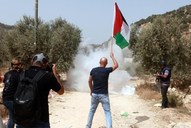
The Israeli Occupation Forces (IOF) suppressed Sunday afternoon a peaceful march in Beit Jala that was organized in protest against the Israeli Apartheid Wall that will confiscate 3500 dunums of the town's land.
National Palestinian figures participated in the march, raising anti-wall banners.
The participants also chanted slogans against Israel’s racist policies against Palestinian towns and villages.
Israeli heavily-armed forces brutally attacked the protesters once they reached the separation wall area.
National Palestinian figures participated in the march, raising anti-wall banners.
The participants also chanted slogans against Israel’s racist policies against Palestinian towns and villages.
Israeli heavily-armed forces brutally attacked the protesters once they reached the separation wall area.
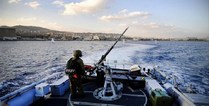
Israeli gunboats on Sunday evening opened their machinegun fire at Palestinian fishing boats off the coast of Khan Younis, south of the Gaza Strip.
Eyewitnesses said the fishermen were working within the fishing zone permitted by Israel when they were attacked by the navy.
They added that the intensity of the gunfire forced the fishermen to swiftly move back to shore, with no reported casualties or material damage.
Eyewitnesses said the fishermen were working within the fishing zone permitted by Israel when they were attacked by the navy.
They added that the intensity of the gunfire forced the fishermen to swiftly move back to shore, with no reported casualties or material damage.
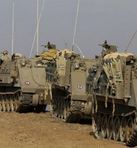
Several Israeli military vehicles, and bulldozers, carried out on Monday morning, a limited invasion into Palestinian lands east of Jabalia town, in the northern part of the Gaza Strip.
Eyewitnesses said the soldiers advanced dozens of meters into Palestinian lands, close to the border fence, and bulldozed them.
The army conducts frequent limited invasion into border areas in the coastal region, bulldozes and uproots lands, in addition to firing on homes, farmers and workers.
On Saturday at dawn, the army fired several missiles targeting different areas of the besieged Gaza Strip, causing excessive damage to homes and structures, while one Palestinian was injured.
On Sunday, the Al-Qassam Brigades, the armed wing of the Hamas movement, said it has captured an Israeli army drone in the north of the besieged Gaza Strip, the second such incident in about two months.
Eyewitnesses said the soldiers advanced dozens of meters into Palestinian lands, close to the border fence, and bulldozed them.
The army conducts frequent limited invasion into border areas in the coastal region, bulldozes and uproots lands, in addition to firing on homes, farmers and workers.
On Saturday at dawn, the army fired several missiles targeting different areas of the besieged Gaza Strip, causing excessive damage to homes and structures, while one Palestinian was injured.
On Sunday, the Al-Qassam Brigades, the armed wing of the Hamas movement, said it has captured an Israeli army drone in the north of the besieged Gaza Strip, the second such incident in about two months.
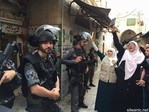
The occupation forces arrested one woman and assaulted several other while they were at Al-Aqsa Gates after being prevented from entering Al-Aqsa Mosque.
Wadi Hilweh Information Center was informed that the occupation arrested Jihad Ghazzawi after assaulting and beating her.
Since the morning hours, the forces assaulted the women present at Al-Silsileh Gate and forced them to stay away from the area while a group of settlers protested in the area and practiced their religious rituals protected by the Israeli police in an attempt to provoke the Jerusalemites.
The forces harassed the women near Al-Aqsa Gates and attempted to prevent them from staying around the gates especially Al-Majles and l-Qataneen; they randomly sprayed pepper gas near Hutta Gate.
It is noteworthy that the occupation forces prevented nearly 60 Palestinians from entering Al-Aqsa Mosque (men, women and journalists) under the pretext of initiating problems inside Al-Aqsa; note that their names are listed in the “black lists” distributed at Al-Aqsa Gates.
On Sunday, 146 extremist settlers broke into the courtyards of Al-Aqsa Mosque through Dung Gate protected by the police amid chants of “God is Great” by the worshippers.
He occupation police continued on Sunday to detain the men’s IDs before entering Al-Aqsa Mosque.
Journalists’ sit-in
A group of journalists carried out a sit-in near Al-Qataneen Gate to condemn the Israeli assaults against them in the past few days as several journalists were attacked, injured or arrested.
Arrests
The occupation authorities arrested on Sunday early morning three young men from the village of Jabal Al-Mukabber after raiding their homes. The detainees are: Mohammad Wasim Aweisat, Mohammad Aziz Aweisat and Jihad Ahmad Sroor.
The forces also arrested the child Bara’ Mahmoud from the village of Esawyeh.
Wadi Hilweh Information Center was informed that the occupation arrested Jihad Ghazzawi after assaulting and beating her.
Since the morning hours, the forces assaulted the women present at Al-Silsileh Gate and forced them to stay away from the area while a group of settlers protested in the area and practiced their religious rituals protected by the Israeli police in an attempt to provoke the Jerusalemites.
The forces harassed the women near Al-Aqsa Gates and attempted to prevent them from staying around the gates especially Al-Majles and l-Qataneen; they randomly sprayed pepper gas near Hutta Gate.
It is noteworthy that the occupation forces prevented nearly 60 Palestinians from entering Al-Aqsa Mosque (men, women and journalists) under the pretext of initiating problems inside Al-Aqsa; note that their names are listed in the “black lists” distributed at Al-Aqsa Gates.
On Sunday, 146 extremist settlers broke into the courtyards of Al-Aqsa Mosque through Dung Gate protected by the police amid chants of “God is Great” by the worshippers.
He occupation police continued on Sunday to detain the men’s IDs before entering Al-Aqsa Mosque.
Journalists’ sit-in
A group of journalists carried out a sit-in near Al-Qataneen Gate to condemn the Israeli assaults against them in the past few days as several journalists were attacked, injured or arrested.
Arrests
The occupation authorities arrested on Sunday early morning three young men from the village of Jabal Al-Mukabber after raiding their homes. The detainees are: Mohammad Wasim Aweisat, Mohammad Aziz Aweisat and Jihad Ahmad Sroor.
The forces also arrested the child Bara’ Mahmoud from the village of Esawyeh.
20 sept 2015
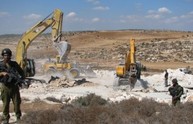
According to local sources, Israeli forces demolished five Palestinian-owned stores in the town of Hezma, just northeast of Jerusalem, on Sunday. Soldiers also reportedly assaulted two young Palestinian women during an incursion in the town of Beit Ummar, north of Hebron.
WAFA reports that an Israeli army team broke into the town, Sunday morning, and demolished five tinplate-surfaced stores, including a stone-cutting workshop, under the pretext of construction without a permit.
The stores are located in Area C, under complete Israeli military and administrative control.
The Israeli army and police have repeatedly vandalized residencies in Area C under the pretext of construction without permission.
Despite filing applications and constantly trying to build houses following the legal measures, Palestinians in the West Bank, especially East Jerusalem, are rarely granted construction permits by Israeli occupation authorities.
Although Palestinians in East Jerusalem are living in a part of the internationally recognized Palestinian Territory that has been under Israeli military occupation since 1967, they are denied citizenship and classified only as 'residents' whose permits can be revoked if they move away from the city.
They are also discriminated against in all aspects of life including housing, employment and services, and remain unable to access services in the West Bank due to the construction of Israel's apartheid wall.
In 2014 alone, Israeli authorities demolished a total of 97 buildings in East Jerusalem, while demolished five others in 2015, under the pretext of building without a construction permit, reported the United Nations Office for the Coordination of Humanitarian (OCHA).
Also on Sunday, Israeli soldiers assaulted two young Palestinian women during an incursion in the town of Beit Ummar, north of Hebron, according to local sources.
Mohammad Awad, coordinator of the Anti-Settlement Committee in the town, said an Israeli army force stormed the house of Khalil Abu-Dayyeh, a local Palestinian, and brutally assaulted his daughter, 20-year-old Nabila, leaving bruises throughout her body.
While the army assaulted and pepper sprayed 22-year-old Jamila Abu-Dayyeh, clashes erupted between Israeli soldiers and Palestinian youths in the same town. The soldiers used teargas canisters and rubber-coated bullets, causing multiple cases of suffocation by teargas inhalation.
Incidents of violence by Israeli soldiers against Palestinians, including children and women, have regularly been reported, either during Israeli arrest operations, home searches and raids, violent suppression of peaceful demonstrations, or while serving jail sentences in Israeli jails.
Many Palestinians have been injured or shot dead on sight for allegedly assaulting Israeli soldiers despite the fact they usually pose no threat to the lives of soldiers.
On July 23, Israeli army and undercover forces raided a house in Beit Ummar and shot dead an unarmed Palestinian elderly, 53-year-old Falah Abu-Maria, and injured his two sons, Mohammad and Ahmed, with live ammunition.
WAFA reports that an Israeli army team broke into the town, Sunday morning, and demolished five tinplate-surfaced stores, including a stone-cutting workshop, under the pretext of construction without a permit.
The stores are located in Area C, under complete Israeli military and administrative control.
The Israeli army and police have repeatedly vandalized residencies in Area C under the pretext of construction without permission.
Despite filing applications and constantly trying to build houses following the legal measures, Palestinians in the West Bank, especially East Jerusalem, are rarely granted construction permits by Israeli occupation authorities.
Although Palestinians in East Jerusalem are living in a part of the internationally recognized Palestinian Territory that has been under Israeli military occupation since 1967, they are denied citizenship and classified only as 'residents' whose permits can be revoked if they move away from the city.
They are also discriminated against in all aspects of life including housing, employment and services, and remain unable to access services in the West Bank due to the construction of Israel's apartheid wall.
In 2014 alone, Israeli authorities demolished a total of 97 buildings in East Jerusalem, while demolished five others in 2015, under the pretext of building without a construction permit, reported the United Nations Office for the Coordination of Humanitarian (OCHA).
Also on Sunday, Israeli soldiers assaulted two young Palestinian women during an incursion in the town of Beit Ummar, north of Hebron, according to local sources.
Mohammad Awad, coordinator of the Anti-Settlement Committee in the town, said an Israeli army force stormed the house of Khalil Abu-Dayyeh, a local Palestinian, and brutally assaulted his daughter, 20-year-old Nabila, leaving bruises throughout her body.
While the army assaulted and pepper sprayed 22-year-old Jamila Abu-Dayyeh, clashes erupted between Israeli soldiers and Palestinian youths in the same town. The soldiers used teargas canisters and rubber-coated bullets, causing multiple cases of suffocation by teargas inhalation.
Incidents of violence by Israeli soldiers against Palestinians, including children and women, have regularly been reported, either during Israeli arrest operations, home searches and raids, violent suppression of peaceful demonstrations, or while serving jail sentences in Israeli jails.
Many Palestinians have been injured or shot dead on sight for allegedly assaulting Israeli soldiers despite the fact they usually pose no threat to the lives of soldiers.
On July 23, Israeli army and undercover forces raided a house in Beit Ummar and shot dead an unarmed Palestinian elderly, 53-year-old Falah Abu-Maria, and injured his two sons, Mohammad and Ahmed, with live ammunition.
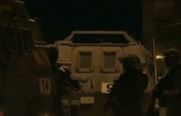
Israeli soldiers invaded, on Sunday at dawn, several Palestinian communities in the West Bank districts of Jenin and Ramallah, searched homes and kidnapped four in Jenin, and two in Ramallah. One of the kidnapped was shot by army fire prior to his abduction.
Several military vehicles invaded the Jenin refugee camp, and Jabal Abu Thheir area in the northern West Bank city of Jenin, before the soldiers stormed a number of homes and violently searched them, causing property damage.
The soldiers kidnapped Qais Ghaleb Mohammad ‘Arqawi, 20, Mo’men Mohammad Touqan, 19, Haitham Hatem Nabhan, 20, and Mohammad Jamal Abu Saqer, 18, who was shot by army fire before the soldiers abducted him.
In addition, soldiers invaded Nabi Saleh village, west of Ramallah, stormed homes and kidnapped 2 Palestinians, identified as Maher Mahmoud Tamimi, 19, and Ezzeddin Abdul-Hafith Tamimi, 18. Maher was injured after the soldiers assaulted him.
The invasion led to clashes between the soldiers and many local youths; the army fired gas bombs at the protesters and a number of homes, in addition to firing concussion grenades; several Palestinians suffered the effects of tear gas inhalation.
On Saturday at night, Israeli extremists opened fire on a Palestinian car near Beit Dajan village, east of the northern West Bank city of Nablus.
Resident Ammar Sarkaji said he was driving near the main entrance of the village, and that his daughter was with him. The attack led to property damage but no injuries.
Several military vehicles invaded the Jenin refugee camp, and Jabal Abu Thheir area in the northern West Bank city of Jenin, before the soldiers stormed a number of homes and violently searched them, causing property damage.
The soldiers kidnapped Qais Ghaleb Mohammad ‘Arqawi, 20, Mo’men Mohammad Touqan, 19, Haitham Hatem Nabhan, 20, and Mohammad Jamal Abu Saqer, 18, who was shot by army fire before the soldiers abducted him.
In addition, soldiers invaded Nabi Saleh village, west of Ramallah, stormed homes and kidnapped 2 Palestinians, identified as Maher Mahmoud Tamimi, 19, and Ezzeddin Abdul-Hafith Tamimi, 18. Maher was injured after the soldiers assaulted him.
The invasion led to clashes between the soldiers and many local youths; the army fired gas bombs at the protesters and a number of homes, in addition to firing concussion grenades; several Palestinians suffered the effects of tear gas inhalation.
On Saturday at night, Israeli extremists opened fire on a Palestinian car near Beit Dajan village, east of the northern West Bank city of Nablus.
Resident Ammar Sarkaji said he was driving near the main entrance of the village, and that his daughter was with him. The attack led to property damage but no injuries.

Israeli warplanes launched mock raids on the Gaza Strip on Sunday morning, Quds Press reported.
The agency said that a big number of Israeli F-16s suddenly appeared in the skies of Gaza Strip and launched mock raids.
It said that the warplanes flew at low altitudes and broke the sound barrier causing panic among civilians who feared that fresh raids were in the making.
Quds Press noted that intensive overflights of reconnaissance planes were seen over the Gaza borders.
Israeli warplanes launched a series of raids on Gaza on Saturday targeting resistance training sites and a communication tower.
The agency said that a big number of Israeli F-16s suddenly appeared in the skies of Gaza Strip and launched mock raids.
It said that the warplanes flew at low altitudes and broke the sound barrier causing panic among civilians who feared that fresh raids were in the making.
Quds Press noted that intensive overflights of reconnaissance planes were seen over the Gaza borders.
Israeli warplanes launched a series of raids on Gaza on Saturday targeting resistance training sites and a communication tower.
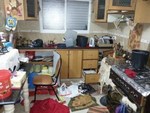
The Israeli occupation troops at dawn Sunday rolled into the Jenin refugee camp, in the northern West Bank, and nabbed three Palestinian youths.
A PIC news reporter quoted local sources as stating that dozens of heavily-armed Israeli soldiers stormed the Jenin camp at dawn time and attacked the unarmed Palestinian youths with random gunshots.
The assault culminated in the abduction of three Palestinian youths identified as 19-year-old Mo’men Husam Tuquan along with Haytham Hatem Nabhan and Qays Arkawi, both in their 20’s of age.
The Israeli occupation soldiers cordoned off residential neighborhoods and pitched a number of checkpoints across Jenin streets before they withdrew from the area.
A PIC news reporter quoted local sources as stating that dozens of heavily-armed Israeli soldiers stormed the Jenin camp at dawn time and attacked the unarmed Palestinian youths with random gunshots.
The assault culminated in the abduction of three Palestinian youths identified as 19-year-old Mo’men Husam Tuquan along with Haytham Hatem Nabhan and Qays Arkawi, both in their 20’s of age.
The Israeli occupation soldiers cordoned off residential neighborhoods and pitched a number of checkpoints across Jenin streets before they withdrew from the area.
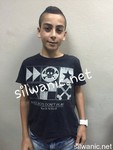
Mohammad Hani Issa 13
One Palestinian child was shot in the head, with an Israeli rubber-coated steel bullet, on Saturday at night, suffering a serious injury, after the soldiers invaded the al-‘Eesawiyya town, in occupied East Jerusalem. Army also kidnapped seven Palestinians in Jerusalem.
The Wadi Hilweh Information Center in Silwan (Silwanic), in Jerusalem, said the wounded child, Mohammad Issa, 13 years of age, suffered fractures in his skull and a traumatic brain injury.
He was moved to the Al-Makassed Islamic Charitable Society Hospital, and later to the Hadassah Israeli Hospital, in Jerusalem.
The Child’s uncle said the medical condition of his nephew is serious, and that, before the child was moved to Hadassah, he was unable to move his right arm.
Mohammad Abu al-Hummus, member of the Follow-up Committee in Silwan, said dozens of soldiers invaded al-‘Eesawiyya, and conducted provocative acts against the residents before storming a shop, and kidnapped five children.
In addition, soldiers invaded Sheikh Jarrah neighborhood, in Jerusalem, searched property, and kidnapped Mohammad Hani ‘Asaliyya, after assaulting and wounding him.
Soldiers also invaded Bab Hatta neighborhood searched homes and kidnapped Mohammad Jayyoushi, 31.
The army claims the Palestinians are involved clashes with the soldiers and police in the Al-Aqsa Mosque, and various areas on the occupied city.
Silwanic said the soldiers have kidnapped twenty-seven Palestinians, mainly children, in different parts of occupied Jerusalem, since Friday.
One Palestinian child was shot in the head, with an Israeli rubber-coated steel bullet, on Saturday at night, suffering a serious injury, after the soldiers invaded the al-‘Eesawiyya town, in occupied East Jerusalem. Army also kidnapped seven Palestinians in Jerusalem.
The Wadi Hilweh Information Center in Silwan (Silwanic), in Jerusalem, said the wounded child, Mohammad Issa, 13 years of age, suffered fractures in his skull and a traumatic brain injury.
He was moved to the Al-Makassed Islamic Charitable Society Hospital, and later to the Hadassah Israeli Hospital, in Jerusalem.
The Child’s uncle said the medical condition of his nephew is serious, and that, before the child was moved to Hadassah, he was unable to move his right arm.
Mohammad Abu al-Hummus, member of the Follow-up Committee in Silwan, said dozens of soldiers invaded al-‘Eesawiyya, and conducted provocative acts against the residents before storming a shop, and kidnapped five children.
In addition, soldiers invaded Sheikh Jarrah neighborhood, in Jerusalem, searched property, and kidnapped Mohammad Hani ‘Asaliyya, after assaulting and wounding him.
Soldiers also invaded Bab Hatta neighborhood searched homes and kidnapped Mohammad Jayyoushi, 31.
The army claims the Palestinians are involved clashes with the soldiers and police in the Al-Aqsa Mosque, and various areas on the occupied city.
Silwanic said the soldiers have kidnapped twenty-seven Palestinians, mainly children, in different parts of occupied Jerusalem, since Friday.
